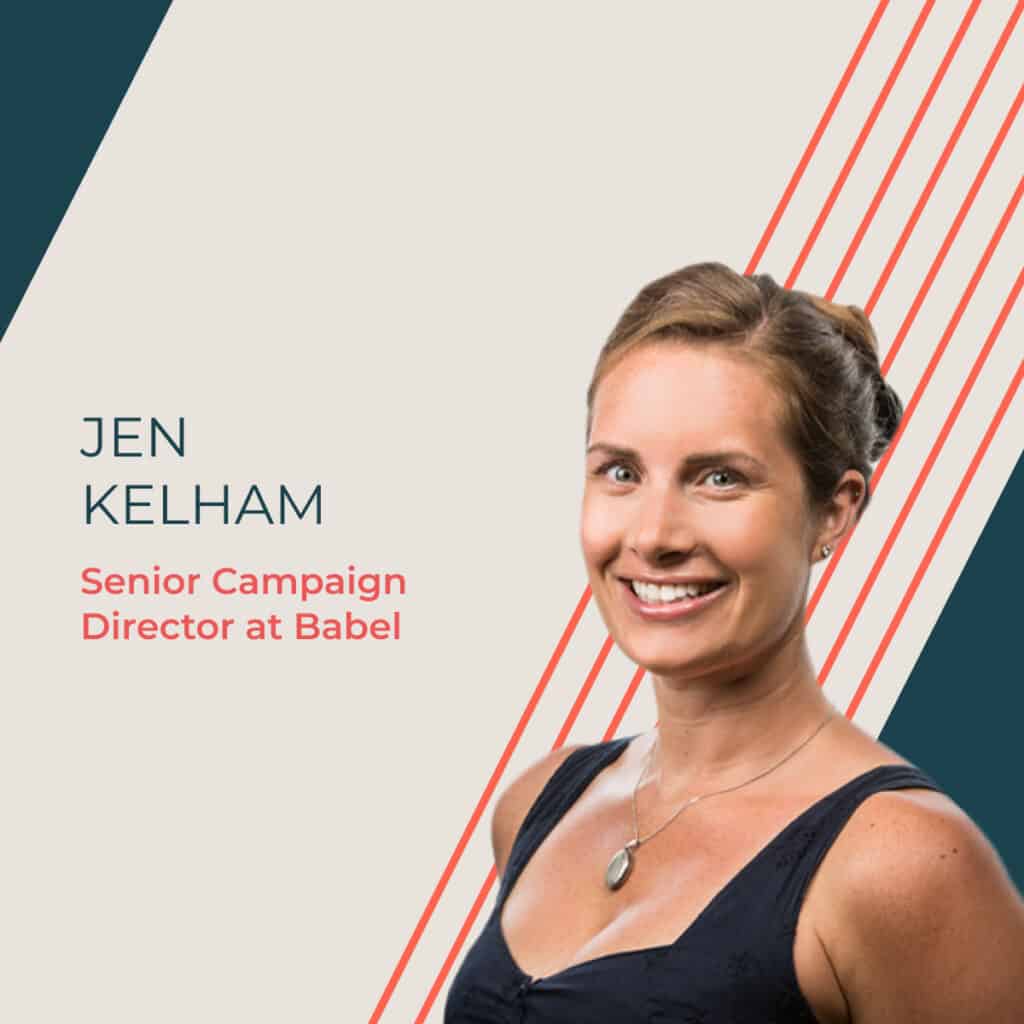International Women's Day 2024: Championing women for continuous change
As you may know, "inspire inclusion" is this year's theme for�International Women's Day. Over a century ago, the first IWD signified women worldwide rallying against patriarchal societies. Today, amidst digital democracy, online activism often goes unnoticed and gets lost in the noise. Yet, this day embodies women's collective efforts to exist in an equitable society. Whether it's a post, a discussion group, a blog, or a song, I'll argue they're all impactful and have their place in the collective race towards effective and long-lasting change. It's critical though, that we stay focused on actions - not just words - and that this continues beyond just one day in the year.
At Babel, we're deeply invested in diversity, equality, and inclusion beyond the superficial. Despite the rhetoric surrounding International Women's Day acknowledgement, if we can't champion ourselves and amplify our challenges today, how can we work towards the changes women desire and require?�
We've kicked off our week with a brainstorming session for the launch of our women in tech working group, facilitating a safe space and some food for thought, in the hopes of driving further change and inclusion in the technology sector. Speaking of inspiration, we've caught up with significant women in our inner communities across the tech industry to share their views.�

Let's start with�Sheela Kosaraju, Senior Vice President, General Counsel at�Ciena�who is passionate about supporting the next generation of women who continue to enrich the tech sector with their fresh ideas and diverse perspectives.
1) What are you most excited about for the future of technology, and how do you see women shaping it?
I am most excited about the potential around emerging technologies, such as artificial intelligence. AI holds a lot of power in automating daily tasks, spurring creativity, and enhancing productivity and efficiency. I'm looking forward to seeing how AI will continue to be an integral part of our everyday lives and will shape the future of the tech space.
It's also heartening to see more women in leadership positions in the tech space, resulting in more robust decision-making that is a natural outcome of integrating more diverse perspectives. From my own experience, I have witnessed so many incredible women in the industry bring new and unique insights and experiences to the table, and also act as great role models while making space for the voices of other talented women to be heard.
And I'm eager to watch the next generation of women continue to enrich the tech sector with their fresh ideas and diverse perspectives, playing a pivotal role in making technology more accessible and inclusive.�
2) What can we do as individuals or companies to create a more inclusive and equitable tech workplace?
Companies should foster a culture of respect and inclusivity which, in addition to being a value we should all care about, and it also delivers a business return. Of course, we should continue to enhance fair hiring practices, diversity and inclusion policies and education, mentorship and training programs, employee resource groups, and co-sponsoring programs with peer companies and/or customers.
As individuals, we need to be allies and advocates for underrepresented groups. Some of the ways you can do this: sign up to be a mentor, use your influence to promote inclusion, and stand up against discrimination when you see it - these are all ways in which we can create an environment in which everyone can thrive.
�

Now, some further perspectives from�Susie Evershed, corporate comms lead for EMEA at� Secureworks�who lives and breathes everything cybersecurity, immersing herself in everything from the engineering, development, and media trends like deep fakes and AI.
1) What are you most excited about for the future of technology, and how do you see women shaping it?
I think right now what's exciting is seeing the application of new technologies for good. From improving sustainability to managing health, there's a lot to be excited about. With more women and diversity in the tech space, this means we're going to see more of a focus on areas that haven't been prioritised before. For example, women's health and the science and tech that can support with childbearing, cancer screenings and menopause.
2) What can we do as individuals or companies to create a more inclusive and equitable tech workplace?
Understanding is crucial to having a more inclusive and equitable workplace. We are not all the same. Not all women are the same, not all people from different backgrounds are the same. By being genuinely engaged and understanding about the way people work best and taking steps to enable that, is being talked about; but not enough is being done to enable it. So much of our working habits are based on "norms" which just don't exist - one parent being the single earner, a five-day week working 9-5 etc. So much of our work is now international, or connected to others that these norms just don't apply - especially when it comes to enabling people to work in the way that's best for them. Understanding that, and how it evolves, and taking actions to support individuals is so important.
3) Who are your female role models in the tech industry, and why?
I'm very fortunate to work with a lot of incredibly brilliant women at Secureworks. They are all role models to me for the way they passionately work to protect against cyber criminals, but also the way in which they all support other women and communities. From Wendy Thomas, CEO who is involved in an international youth exchange programme, to Rebecca Taylor, knowledge manager in the Counter Threat Unit, who mentors a huge number of women in the industry. The most inspiring people to me are those who do their work with a genuine passion and make time to give back as well.
4) What one piece of advice would you tell your younger self?
My advice to my younger self would be that feedback is a gift, but it's not always true. Take constructive feedback, listen to it, sit with it and look at what action you need to take to grow. But also acknowledge when you don't need to take action. And don't forget to take the praise. Listen to it, sit with it and BELIEVE IT!

Next up is�Eugina Jordan, chief marketing officer at�TIP, alongside her continuous championing of women in tech, author of�Unlimited�and awarded Top Voice on LinkedIn for marketing, product marketing and leadership.� �
1) What are you most excited about for the future of technology, and how do you see women shaping it?
I'm thrilled about the potential of technology to do good in the world, especially with the integration of AI. What really excites me is the pivotal role women can play in shaping this future, particularly those with a strong sense of empathy. As we continue to develop AI systems, ensuring they are ethical and equitable will be crucial, and women's perspectives, often rooted in empathy, will be instrumental in achieving this goal.
2) What can we do as individuals or companies to create a more inclusive and equitable tech workplace?
As individuals or companies, we hold the key to building a tech workplace that's truly inclusive and equitable. It's about going beyond mere diversity checkboxes and embracing the richness that comes with different perspectives and experiences. Sponsorship is key�mentioning their names in the rooms they're not in, advocating for their advancement, and providing opportunities for growth. Imagine the impact if we all committed to fostering an environment where everyone can thrive.
3) Who are your female role models in the tech industry, and why?
Hedy Lamarr�is my ultimate role model in the tech industry. She embodies authenticity, femininity, and sheer badassery all rolled into one incredible tech persona. What sets her apart is not just her technical prowess, but her ability to remain true to herself in an often male-dominated field. She's a trailblazer who shows that you can be feminine, authentic, and still kick serious tech butt. Hedy inspires me to embrace my own unique qualities and never compromise on who I am, no matter the industry I'm in.
4) What one piece of advice would you tell your younger self?
Believe in yourself. You're smarter and stronger than you think.

Now we have�Katia Gonzalez, Head of Fraud and Security at�BICS, a seasoned telecoms professional who works tirelessly to restore trust in the telecom ecosystem, but is also an ambassador for Capacity Media's emPOWERED Network.�
1) What are you most excited about for the future of technology, and how do you see women shaping it?
In my opinion, technology and telecoms continue to be the most exciting and dynamic of all the industries. One of the most exciting things about telecoms is what a difference it can make in people's lives. Connecting the unconnected is crucial, especially in regions with significant technology gaps, where women are often left behind. This disparity not only limits access to opportunities and development but also hinders societal progress, highlighting the need for inclusivity and equal access to technology.
For the industry to thrive, however, we need diverse environments to foster creativity and disruptive ideas, and to do this I'd like to emphasise the importance of women and the younger generation in challenging the status quo and bringing fresh perspectives.�
2) What can we do as individuals or companies to create a more inclusive and equitable tech workplace?
Companies can take several steps:�
- Address the gender pay gap by ensuring transparency in salary ranges per role
- Establish parity in rights and obligations such as equal paternity and maternity leave
- Open positions with a requirement for a minimum percentage of female applicants while maintaining the commitment to hire the best candidate.
Hybrid work policies can also contribute to inclusivity. On an individual level, women can play a crucial role by supporting and elevating each other and acting as ambassadors for their achievements and those of other women.
3) Who are your female role models in the tech industry, and why?
This is a difficult one! Identifying specific female role models in the tech industry is challenging because I find inspiration from all the women I know personally, each in their own unique way. While I observe more women attaining leadership positions in technology companies, indicating progress, there's still a noticeable lack of gender diversity across all levels of the industry, suggesting there's room for improvement in terms of representation and inclusivity.
4) What one piece of advice would you tell your younger self?
If I could offer advice to my younger self, I would emphasise the importance of self-assurance and kindness. I would reassure myself that I am capable, and encourage self-compassion, reminding myself to be kind and understanding in the face of challenges and setbacks. You're not going to get everything right every time, and that's ok - take the mistakes as an opportunity to grow, but don't beat yourself up about it.

Now over to�In�s Guittonneau, who works tirelessly as the communications officer for� T�l�coms Sans Fronti�res�to raise awareness of the NGO's work providing emergency-response technologies during humanitarian crises, alongside initiatives supporting women to expand their knowledge and experience with technology:� �
1) What are you most excited about for the future of technology, and how do you see women shaping it?
I don't know what the future of technology holds. I'm excited for people to be able to share ideas and discussions thanks to connectivity, and I hope the efforts to bridge the digital divide can mean more people have a seat at the (virtual) table. However, we have seen that technology can be harmful for women, who can be attacked online to a scale that wasn't possible before. What I see, or rather hope, for the future of technology, is for women to take more and more part in creating it, regulating it, and making technology adapted to women and online spaces safe for them.
2) What can we do as individuals or companies to create a more inclusive and equitable tech workplace?
For companies, one step can be to have more flexibility - flexible hours, remote working, etc. When it's not there, women are often the first to have to work part-time or not join a specific industry that doesn't adapt. Implementing training for all employees to be mindful of discriminatory behaviors and remarks can also be a way to make tech companies more inclusive. Finally, visibility-wise, I believe it's important for tech companies to broadcast their inclusive approach, explain how they make their companies inclusive and represent diversity, so that minorities outside of the company feel encouraged to apply.
From an individual perspective, we should also be alert and speak up when we hear or see something that perpetuates harmful stereotypes.�
3) Who are your female role models in the tech industry, and why?
Mae Jemison�- I've read a lot about her and her many experiences. She's an American engineer, a physician, and she was a NASA astronaut. She was the first Afro-American woman to travel into space, in 1992! What I loved and what kept me coming back to reread her story was that she was passionate and had an unquenchable thirst for knowledge. She also danced, served as a medical officer in the Peace Corps, and was a super-fan of Star Trek - I love that she is so open about loving many things and that, rather than hold you back, this plurality makes you stronger. She was a big inspiration for me when I was studying: I was doing two degrees at the same time, so she inspired me to study hard, keep my mind open and do what feels right to me.
Monique Lanne-Petit�- Monique is the director and co-founder of the organisation I work for, T�l�coms Sans Fronti�res. I'm in awe of her ability to manage so many things at once, her experience and her drive to try and help so many people around the world through technology. I admire her creating an NGO - with our co-founder - based on a need that nobody had really recognised when she was only around my age (early twenties)! She's not afraid to speak up and she still takes the time to listen, understand, empathise - many qualities girls are often raised with, and that tends to be less encouraged in positions of power.
4) What one piece of advice would you tell your younger self?
Do what feels right, and the rest will follow!

And finally,�Jen Kelham,�Senior Campaign Director at Babel. In addition to working with her portfolio of clients, Jen is spearheading Babel's �women in tech' working group, an initiative to support team members and host networking events with women across the tech and telecoms industry.
1) What are you most excited about for the future of technology, and how do you see women shaping it?
For me, I believe the future of technology holds promise in addressing critical global challenges like climate change, healthcare, and accessible education. We are increasingly seeing women shape this future by assuming leadership roles, pursuing and encouraging STEM education, founding businesses, providing diverse perspectives, and advocating for greater representation in the tech industry. Our contributions are essential for driving innovation and creating more inclusive solutions.
2) What can we do as individuals or companies to create a more inclusive and equitable tech workplace?
Creating a more inclusive and equitable tech workplace takes a committed approach. Educating teams on diversity and inclusion; actively recruiting from underrepresented groups; implementing inclusive policies, practices, and working groups; fostering a culture of belonging; providing growth opportunities; celebrating diversity; holding leadership accountable for promoting inclusivity.��
By fulfilling these actions, we can cultivate environments where all employees feel valued, respected, and empowered to contribute their unique perspectives, ultimately driving innovation and success for their workplaces.
3) Who are your female role models in the tech industry, and why?
I am fortunate not to look too far afield to find female role models. Colleagues at Babel, both past and present, have had a major influence on shaping the PR professional I am today, and we've worked with some tremendously inspiring clients who advocate female leadership within the tech industry.�
4) What one piece of advice would you tell your younger self?
If I could go back in time, I would tell my younger self to not compare myself to others. Everyone has their strengths and weaknesses, and they should be celebrated and utilised appropriately: that's the key to a cohesive, winning team!
As I reflect on nearly 20 years working in communications for B2B technology companies, I'm grateful to work with clients at Babel who share our values when it comes to diversity, equality, and inclusion. Eugina from TIP recently reminded me that, "we're industry disruptors that happen to be women." While gender should not define our abilities, recognition for women in the wider tech and PR industry (especially in more senior roles) remains a work in progress. This year, we began with a breakfast brainstorm to inspire ideas and reignite our efforts not just in the tech sector but in all aspects of life! As a working mum of three small children, I'm still juggling and challenging myself in my tech career every day. Despite facing challenges within the industry as a woman in a leadership position, I remain committed to championing gender diversity by hosting networking events, encouraging profiling of women, and implementing structural changes. If you want to read more about my background and my role you can read my interview in WeAreTechWomen or connect with me on LinkedIn.




.jpg)




